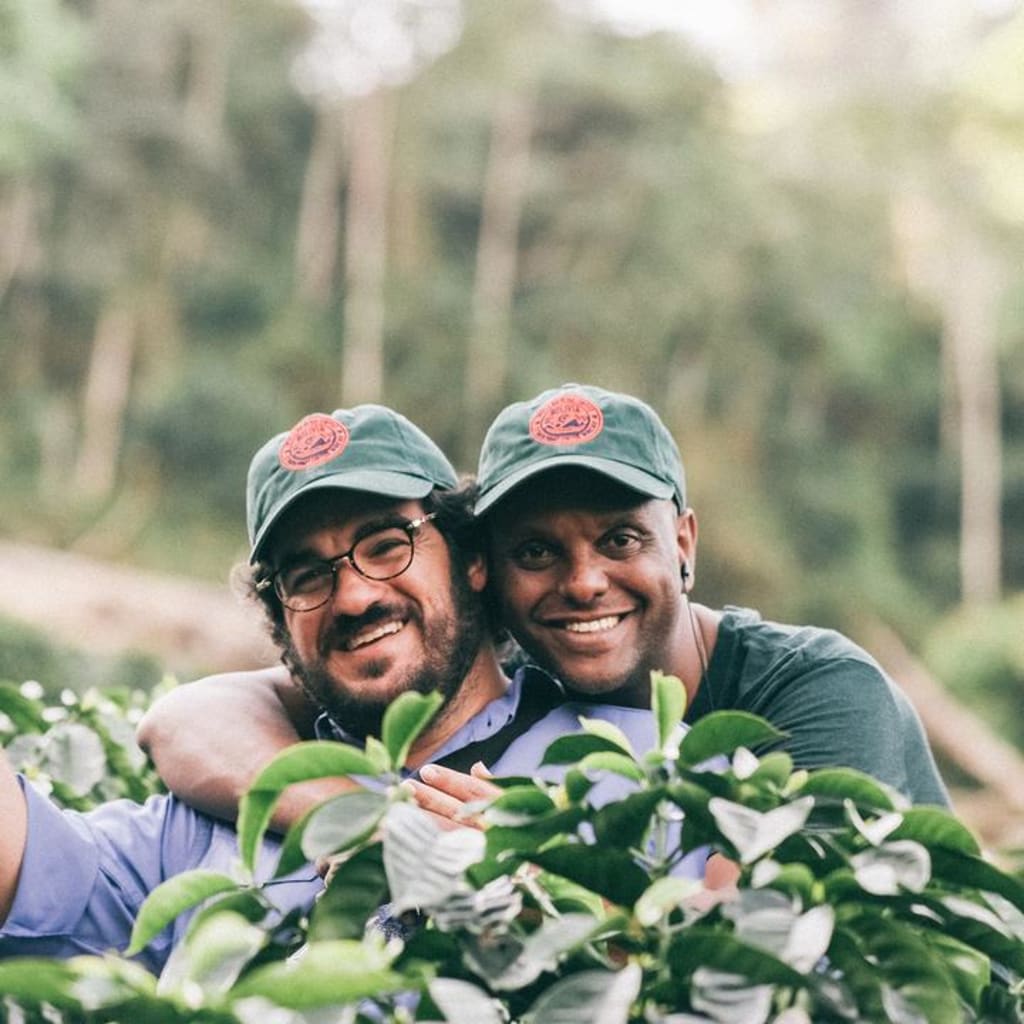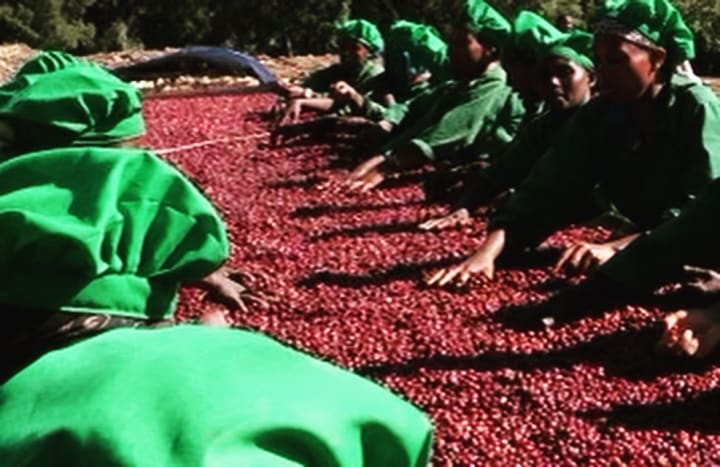Café y Humanidad
Imagina el sabor de la humanidad en un café. Es 100% posible. Imagine the Taste of Humanity in one Coffee. It's 100% Possible. Dare to be transformed by it?

I had never met a man so full of passion for coffee, and more than anything, full of humanity.
It only happens once, in a lifetime, to come across a person with a compelling disposition. A person who despite having the right to safeguard themselves and their triumphs after overcoming brutal turbulent roads across systematic and corporate America, still, that individual chooses to fight for the lives and well-being of others.
It would be a tragedy to him should he not do what he does. It’s as if it were his medicine, to pour out his heart for those who mirror his nature from his homeland. Far more important than making his coffee a dream come true.
The heart of this man is so immense that with his coffee, comes his people, something to speak as loud as the tears and labor of Ethiopian farmers, and equally of the legacy of his groundbreaking grandmother, Muluemebet Emiru, Ethiopia’s and Africa’s First Female Pilot in 1936. Beautiful forces drive a humanistic purpose.
The coffee culture of today, calls Ethiopia the “the birthplace of coffee,” and remarkably, Ethiopia is one of the oldest countries in existence, boasting richness in history, and their biggest pride and significance includes coffee. This country gave the world Coffea arabica, an industry responsible for employing over 15 million people, thus ranking firth place in the World’s Top Coffee Producers.
However, very little does the world know about the thousands of villagers in Ethiopia who give everything as farmers for the coffee the Western world has the privilege to enjoy. There is a big stage for coffee producers, and scarcely for those who make it a reality.
Sounds familiar right? The over-consumption of the Western world blinds us from taking a deep look into where our most savory and admirable products and foods come from. Well, it's about time people stop being slaves to greed and discover the rawness of the most conscientious humans behind a capitalized bean. Building from the ground up, coffee beans, which hold humble pride, joy, laughter. Let alone, tears, heavy labour, and uncertainty for their own lives.
The vast majority of Ethiopia's coffee is grown on over four million smallholder farms. Yes, four million! And within the growing population of these esteemed coffee villagers and farmers, many lack the funds, and resources to sustain themselves and their growing families. Let alone, in a pressing time in 2021 where climate change is a real global emergency for millions of these lives and their endangered species, Ethiopia's small farmers are unable to fully navigate and adapt to the effects of the changing climate.

Thousands and thousands of other Ethiopian coffee farmers whose lives aren't always on the frontlines of the NY Times have witnessed devastating losses such as thousands of dying hectares' of coffee. Reaching tipping points as a result of not having the resources to defeat the consequences of the global climate crisis. As much as they fight for the future of coffee, behind the scenes, they are fighting for theirs.
Smallholder farmers are giving their full selves to their beloved coffee plants and beans, fighting each day to gain access to better seeds, and seedlings, irrigation technology, training, and innovative solutions in a "climate-smart" agriculture. Fundamentally, during moments of crisis as the peak of global warming and the climate rise, Ethiopia's coffee farmers hold a strong moral responsibility for safeguarding themselves and supporting one another in presidential times and in diversifying their farms.

This is where Michael Adinew, the man full of humanity for his coffee and people leads. "Far more than my coffee, and business, it's their livelihoods which matter to me, it's the pump to my purpose," says Adinew. It's about uplifting the people who wake up day and night to safeguard their lives and coffee, as one.
It's something that makes time stop, realizing how much impact a man like Michael has in his homeland. There are no barriers when it comes to putting his coffee farmers first. To this day, Michael has a thriving and cohesive relationship with over 10,000 farmers alone. Upon counting the families of the farmers, it becomes a total estimate of 70,000 lives impacted by his leadership in the industry.
In the next five to ten years, this man will give it his all to push his villages, coffee farmers, and the future of Ethiopian coffee forward. It's a remarkable hope that doesn't give up in spite of a global threat and ego-centered capitalist system in America. It is so "easy" for power and greed to claim that Ethiopian coffee will be pushed to the top of a mountain and that there wouldn't be anything "possible" to be done for them.
Adinew, leading Hambela Farms, Gigesa Natural Coffee, and family organization METAD, has a bold vision to go forward, not alone, but together. Moving forward means:
1. Putting his homeland's farmers and their lives, first
Initiating action across Southern Ethiopia as more small washing stations are being built in Guji to respond to the demand that would mean shifting to regenerative agricultural efforts, agricultural innovation, to expanding new communities that equally impact their youth. Sowing the seeds of prosperous economic opportunities and decent living conditions.
2. Elevating the voices of Ethiopian Women Coffee Farmers
In a community of Jimma, Omo Bako, for instance, where coffee farmers formed a group to overcome the physical labor that coffee farming requires, of the 40 members, only three are women. Of a predominantly conservative Muslim community, women do not typically own land. However, these women inherited the land from their passing spouses. Adinew's Hambela Farm, Gigesa Natural, and family organization METAD, want to make a change to this reality. The future of Ethiopian coffee belongs equally, to women.
3. Undeniable uplift and growth of his sustainable coffee farms and plantations.
They fight to keep their coffee alive, thus means investing in the long-term health of their coffee plants like their people.

This incredible man is fully investing in what will drive infrastructural change however possible. His optimism and perseverance inspire a young generation of today's world, especially when exploring ways to combat issues affecting impoverished people in Africa and around the world who are behind our biggest food sources.
Coffee farmers in Ethiopia and their aspirations cross-intersect with current rising innovative initiatives on fighting the global climate and economic crisis.
This means not only building the above to secure thousands of healthy coffee plantations, safeguarding forests, and plants, but equally, good quality crops. Nutrition is huge for villagers in Africa. Small business partnerships between leading organizations like Eat Just are capable of designing infrastructural tech and change, producing 30 metric tons of Power Gari a month, enough for 600,000 meals. Naturally affordable due to efficiency and local sourcing, thus creating a profound value chain and opportunity to even market female smallholder farmers across countries like Liberia.
Empowering and changing the lives of smallholder farmers is possible, whether they are leading in coffee, to basic food crops, or conservation to protecting their people and species.
Adinew's coffee over the years has received over 87, up to a 95 score for quality, authenticity, ethically sourced coffee beans from his home back in Southern Ethiopia. However, not anyone can truly take a sense of what his coffee means, and the truth behind its taste.

It shouldn't ever take a global climate crisis or a coincidental click on a screen to understand the significance of a foreign coffee and the ones who lead with it. It's clear to a fortunate young lady, that this coffee isn't just any foreign coffee. While it stands with leading coffee partners and industries around the world, from Latino America to South America, capable of reaching the most privileged of hands, its roots and example hold something money cannot buy.
One coffee, full humanity. Un cafe., humanidad plena. Dare to genuinely know its taste?
Author's note:
Please know Mr. Adinew is not open to interviews nor accepting promotions at this time. I was fortunate enough to meet and know Mr. Adinew as a mutual Alma Mater alumni. With his permission, I share my gift of knowing him and his passion, here. Thank you for your understanding and support of my writing.
About the Creator
Enjoyed the story? Support the Creator.
Subscribe for free to receive all their stories in your feed. You could also pledge your support or give them a one-off tip, letting them know you appreciate their work.






Comments
There are no comments for this story
Be the first to respond and start the conversation.